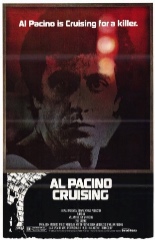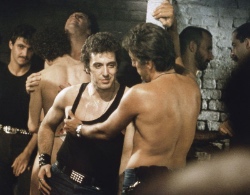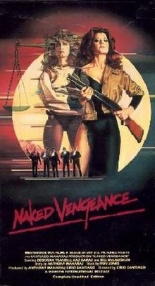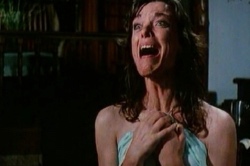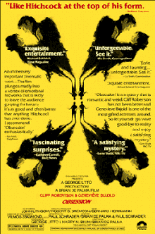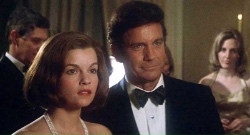
 As the son of an abusive backwater prostitute, Wheeler (John King III, Alien Zone) can’t help but be a Psycho from Texas. With hair not unlike a witch’s broom, he works odd jobs here and there — in this film’s case, it’s to kidnap oilman William Phillips (Herschel Mays), who lives in a mansion with his hot daughter (Candy Dee) and appears to drive the Family Truckster from National Lampoon’s Vacation.
As the son of an abusive backwater prostitute, Wheeler (John King III, Alien Zone) can’t help but be a Psycho from Texas. With hair not unlike a witch’s broom, he works odd jobs here and there — in this film’s case, it’s to kidnap oilman William Phillips (Herschel Mays), who lives in a mansion with his hot daughter (Candy Dee) and appears to drive the Family Truckster from National Lampoon’s Vacation.
Wheeler succeeds with the help of his not-so-slick partner, Slick (Tommy Lamey, Timestalkers), he of the poo-log mustache and habit of chewing strike-anywhere matches. Post-abduction, Wheeler goes to town to cash a big, fat Phillips check and score some weed; meanwhile, Phillips wrangles loose and runs and runs and runs, through woods and wild hogs, with Slick right behind him.
 It’s not exactly roiling with plot. However, being a low-budget hicksploitation effort, no one demands it be. The only movie written, directed and produced by stuntman Jim Feazell, the El Dorado, Arkansas-lensed Psycho from Texas is an entertaining single serving of sleaze and a marvel of atonality. The soundtrack’s boing-boing-boing of a jew’s harp is squarely at odds with the homicidal action onscreen. Same goes for the original song “Yesterday” — not that one — which gets needle-dropped in the oddest of places, possibly to justify whatever Feazell paid for it.
It’s not exactly roiling with plot. However, being a low-budget hicksploitation effort, no one demands it be. The only movie written, directed and produced by stuntman Jim Feazell, the El Dorado, Arkansas-lensed Psycho from Texas is an entertaining single serving of sleaze and a marvel of atonality. The soundtrack’s boing-boing-boing of a jew’s harp is squarely at odds with the homicidal action onscreen. Same goes for the original song “Yesterday” — not that one — which gets needle-dropped in the oddest of places, possibly to justify whatever Feazell paid for it.
If the regional thriller is remembered for anything, it’s as the debut for scream queen Linnea Quigley (Witchtrap). She plays a barmaid to whom Wheeler brings a box of Kentucky Fried Chicken and demands she dance for him. She refuses. He forces her, with the howler of a line, “Now, bitch, let’s dance!” As she tearfully gyrates, he keeps screaming, “Dance! Dance!” and dumps a pitcher of beer over her fully nude body. With this scene, King goes for broke and kick-starts a career — just not his. —Rod Lott

